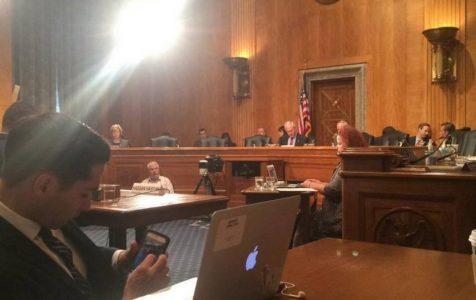
Human rights activists: ISIS terrorist group has nothing to do with religion
Syrian refugee Subhi Nahas was on his way to university in Homs one day when he was stopped and detained by militants.
The reason? “Because they perceived me as gay,” Nahas said at a Capitol Hill hearing on Tuesday.
Nahas, now an LGBT activist living in San Francisco, said it wasn’t much different from situations LGBT men and women encountered in the United States. While life here is much safer, there are challenges for the American LGBT community; a fact made evident by the murders of 49 people in an Orlando gay bar, Nahas said.
Nahas was one of four witnesses testifying at the Senate Committee on Homeland Security and Governmental Affairs on Tuesday. As part of a hearing on the ideology of ISIS, the human rights activists relayed for senators their impressions of ISIS’s belief system — and how to resist its influence in inspiring violence.
Among the suggestions: anti-bullying efforts so Muslim children are not isolated, refugee resettlement so asylum seekers are integrated into U.S. society and social media training for Muslim religious leaders and politicians who support them.
It was the eighth hearing the committee has held about Islamic terror, said Sen. Ron Johnson, R-Wis., the chairman of the committee.
“Don’t hold back,” Johnson said to witnesses. “Lay out the reality.”
Hassan Hassan, a resident fellow at the Tahrir Institute for Middle East Policy in Washington, described how his family and friends living in an ISIS-controlled area couldn’t go to the market without seeing “severed heads on pipes.”
Tarek Elgawhary, the director of the Religious Studies Programs at the World Organization for Resource Development and Education in Montgomery Village, Maryland, told committee members that ISIS has violated the Islamic faith so seriously that “they have in essence created a parallel religion.”
Nadia Murad, an Iraqi human-trafficking survivor turned human rights activist, detailed for lawmakers how she and thousands of other Yazidi girls had been kidnapped and forced into sexual slavery by ISIS, all because of their religion.
She said a Muslim family had rescued her.
Their testimonies had a common thread: Rather than protecting members of the religion it claims to represent, ISIS is wielding the Islamic faith as a weapon against not only outsiders but also fellow Muslims.
“The very people ISIS claims to represent are victims of its brutality, just as much as everyone else,” Hassan said.
The Orlando shooter Omar Mateen is among sympathizers who are “drawn to ISIS for their political ideology” rather than their religious beliefs, Hassan said. These individuals go on to commit crimes in the name of Islam, though their real motivation — violence — is far different.
“What ISIS stands for has nothing to do with religion whatsoever,” Elgawhary said.
Hassan and Elgawhary encouraged the United States to publicize this contradiction. Spread the word that ISIS does not represent the Islamic beliefs it claims to; rather, it goes against them, they said, and even harms fellow Muslims.
“This is not a sectarian organization,” Hassan said, “it is a crazy organization — an extremist organization —that recast itself in religious terms that the people of that faith rejected.”
Source: Miami Herald





